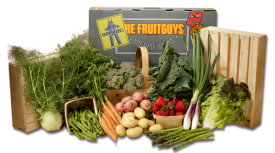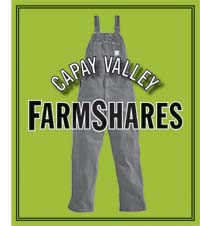Capay Valley FarmShares: Collaboration Brings Small Farms to City Tables
- By Heidi Lewis
- Reading Time: 3 mins.
From a satellite view, Northern California’s Capay Valley looks like a green quilt caught between the folds of the Coast Range. This makes it good for farming with plenty of clean water from Cache Creek running through its protected crí¨che shape. The valley floor is ideal for row crops and the canyon hills for grazing livestock. Its geography has mainly attracted and sustained small family farmers with a diversity of crops from olive oil, fruits, nuts, lavender, herbs and a surfeit of diverse vegetables. “It is this patchwork of enterprises that keep agriculture economically viable,” says Thomas Nelson, president of the Capay Valley Farm Shop.
 What makes produce from this valley taste so good? Good dirt is only one answer. Capay Valley, located 84 miles northeast of San Francisco, is nationally recognized as a farm community that was at the forefront of the food revolution with a vision for a healthy food system and practice of reaching out to consumers to get them involved and excited in the farm-to-table experience.
What makes produce from this valley taste so good? Good dirt is only one answer. Capay Valley, located 84 miles northeast of San Francisco, is nationally recognized as a farm community that was at the forefront of the food revolution with a vision for a healthy food system and practice of reaching out to consumers to get them involved and excited in the farm-to-table experience.
The Capay Valley Farm Shop is an aggregate distributor for small farms and ranches in the valley that might not be big enough to get their harvest to larger markets otherwise. It grew from an idea a few years ago to market the entire Capay Valley as a growing region, much like the concept of terroir, a region’s unique characteristics are used by the French to distinguish wine appellation.
Want farm-fresh fruit?
We've got you covered.
A mutual friend introduced the Farm Shop to The FruitGuys, a South San Francisco-based business that pioneered office fruit delivery, and a unique collaboration was born. “We shared the same interests in supporting small farms and sustainable agriculture practices,” said Chris Mittelstaedt, FruitGuys CEO, and founder. Thus the Capay Valley Farm Shares box was born in 2010, combining Capay Valley Farm Shop’s fabulous produce with The FruitGuys distribution network and Bay Area client list.
“The Capay box is more than just another local box for us, it is the beginning of identifying the experience of terroir through fruits and veggies,” says Chris. “In addition to our regional mixes, we hope to add other specific growing regions going forward. We want to explore, say apples or carrots, and what the taste characteristics might be based on where it was grown.”
 The Capay Valley FarmShares box represents a collective of 27 like-minded farmers shepherded by Thomas who helps to get their succulent greens, robust roots, fresh herbs, and juicy heirlooms direct to market. “It is a way for us to work together under a regional identity that allows for transparency of source,” says Thomas, who is married to the chief farmer at one of the valley’s most storied farms, Full Belly Farm. Currently, the Farm Shop is a hub where the farmer brings her freshly pulled carrots, they go into the Farm Shares box and to your door.
The Capay Valley FarmShares box represents a collective of 27 like-minded farmers shepherded by Thomas who helps to get their succulent greens, robust roots, fresh herbs, and juicy heirlooms direct to market. “It is a way for us to work together under a regional identity that allows for transparency of source,” says Thomas, who is married to the chief farmer at one of the valley’s most storied farms, Full Belly Farm. Currently, the Farm Shop is a hub where the farmer brings her freshly pulled carrots, they go into the Farm Shares box and to your door.
Demand for authentic farm-to-table experiences has increased by 40 percent in the last decade if you look at the increase in farmer’s markets nationally. Most of us agree that when you know your farmer and where your food was grown, it tastes better. And it helps cultivate respect for food in our kids and our selves. It is a way for us non-farmers to contribute to a clean and fair food system.
But all that only counts if you can have access to this wonderful produce. For Bay Area residents, organizations like Farm Shop and the FarmShares case is one way to get it. “We are thrilled to partner with The FruitGuys because the partnerships enables us to distribute our products while keeping the values and relationships that are at the root of our endeavor,” says Thomas.
Want farm-fresh fruit?
We've got you covered.
– Heidi Lewis


